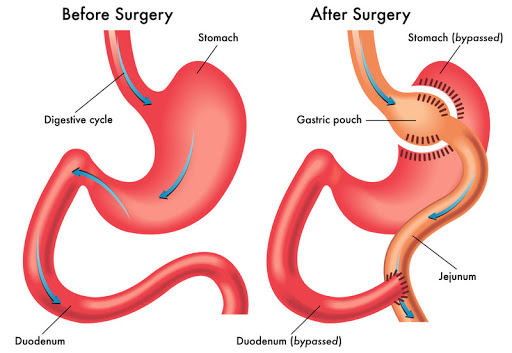
Is Weight Loss Surgery The Smart Choice?
So why do overweight people resort to the seemingly easy fix of bariatric surgery? And why weight loss surgery is bad…
Many times, weight loss surgery is a last resort for patients who struggle with weight. They have tried multiple diets, still failing to lose weight, no matter the type of weight loss programs they ventured out on.
But what is the secret to true weight loss?
Which is still needed and necessary even after bariatric procedures and surgery…
Let’s look at the most common type of bariatric weight loss surgery types:
Laparoscopic Gastric Bypass
This procedure includes adjustable gastric banding, sleeve gastrectomy and biliopancreatic diversion with duodenal switch.
Gastric bypass is the most common type of bariatric surgery currently performed in the U.S. Although, potential patients should weigh the risks and success rates of all weight loss surgery procedures.

Within the gastric bypass procedure, a surgeon makes a small pouch in the upper part of the stomach utilizing staples. Which reduces the amount of food that the stomach can hold.
Secondly, the surgeon then makes the bypass by connecting a section of the small intestine to the new pouch. This bypass prevents food from entering into part of the stomach and small intestine, decreasing the absorption of calories.
This surgery can be either performed through open incision surgery or with a laparoscopy. Which consists of utilizing a tiny camera that is placed through a small incision in the abdomen.
Laparoscopy is recommended for patients with a Body Mass Index (BMI) >40, older than 35 and a diagnosis of one or more comorbidity.
How Is The Success Rate After Surgery Gastric Bypass?
Laparoscopic Roux-en-Y gastric bypass surgery is seen as the gold standard bariatric operation, being the most commonly done bariatric procedure in the United States.
Weight loss results averages 60-65% for most patients with over 80-85% of patients losing and maintaining 50% initial excess weight loss.
The true mark of a successful surgery would be weight loss achieved and the maintenance of said weight loss…although surgeries with few complications or mortality rates are also considered as successful outcomes for both patients and doctors.
A study demonstrated that mortality rates are about 0.1% and serious early complication rates 5%… Long-term effects with fat mal-absorption, protein-energy malnutrition and micronutrient deficiencies are relatively uncommon and can usually be managed with oral supplements.
This study also states that revisions are rarely needed due to failures or complications. Regardless of the good probability of success both in weight loss and correction of obesity-related medical conditions, this operation commands advanced laparoscopic surgical skills with a learning curve as long as 100 cases, and a 10-15% long-term failure rate.
What are The Long-Term Effects of The Gastric Bypass Weight Loss Surgery?
While the initial success of gastric bypass surgery depends mainly on choosing the right surgeon, also an experienced and accredited medical center.
The long-term success of this procedure is determined by the patient’s behavior and habits — specifically, the patient’s willingness to change their eating and exercise routines.
So again, we see whether it’s natural weight loss or surgically induced weight loss, exercise and diet are still the key to lasting success.
This procedure does not “work miracles” because patients need to commit to behavioral changes as well, which includes implementing a healthy diet, regular exercise, taking vitamins and supplements, and following other recommendations enacted by their medical team. Therefore, patients can liken the results of gastric bypass to the results of other types of surgery to truly assess the long-term result of bariatric surgery.
Weight loss starts in the mind, which is why weight loss surgery is bad. Stapling the stomach or attaching a band will not correct the source of the problem of obesity which starts in the brain. You must retrain your brain. Consciously, changing your views and habits towards food, choices and portions as well as intentional physical activity each day.

Reducing or avoiding sedentary behavior is necessary; refraining from fast food; addressing problematic eating behaviors and habits—including continuous eating, habits of eating despite being full, uncontrolled eating and binge eating; and performing self-weighing at least once a week.
Patients with the biliopancreatic diversion with duodenal switch have the highest likelihood of losing excessive weight, while those who undergo gastric banding lose less weight, but subject themselves to less risk from a minimally invasive surgery that is 100% reversible and results in few serious complications.
What Are the Most Common Post-Op Risks & Side Effects of Gastric Bypass?
Here are 8 Gastric Bypass Surgery Risks:
- Acid reflux
- Chronic nausea and vomiting
- Dilation of esophagus
- Inability to eat certain foods
- Infection
- Obstruction of stomach
- Weight gain or failure to lose weight
- Anesthesia-related risks
Long-Term Bariatric Weight Loss Surgery Side Effects?
7 Long-term Risks for Gastric Bypass Surgery Patients:
- Malnutrition
- Vomiting
- Ulcers
- Bowel obstruction
- Hernias
- Dumping syndrome, a condition that can lead to symptoms like nausea and dizziness
- Low blood sugar
Bottom line.
Why weight loss surgery is bad.
There are many possible side effects of this elective surgical procedure. Ultimately, subjecting you to unnecessary risks and complications with your health.
Despite having this procedure, a patient who chooses bariatric surgery and follows all treatment guidelines, or the patient that chooses to naturally lose weight by directly addressing diet and exercise, are both expected not only to lose weight, but also improve their quality of life.
Resolving related comorbidities like type 2 diabetes, heart disease, lung problems or sleep apnea, as well as improving overall health.
Since we see that the key to weight loss success and maintenance of such, is diet and exercise, no matter the diverted route taken…why not start there, at the source…with healthy diet, exercise and mindful movement, avoiding unnecessary surgeries.


Hairstyles Trends
September 21, 2023 at 9:40 amGood web site! I truly love how it is easy on my eyes and the data are well written. I am wondering how I could be notified whenever a new post has been made. I’ve subscribed to your RSS which must do the trick! Have a nice day!
Long Hairstyles
September 21, 2023 at 10:52 amYou helped me a lot with this post. I love the subject and I hope you continue to write excellent articles like this.
KAYSWELL
September 28, 2023 at 9:35 amThanks for posting. I really enjoyed reading it, especially because it addressed my problem. It helped me a lot and I hope it will help others too.
Medium Hairstyles
September 29, 2023 at 7:36 pmYour articles are extremely helpful to me. May I ask for more information?
Short Hairstyles
September 29, 2023 at 7:46 pmSustain the excellent work and producing in the group!
Air Duct Cleaning
September 29, 2023 at 8:37 pmThank you for writing this post!
Health
October 27, 2023 at 12:52 amThank you for your articles. I find them very helpful. Could you help me with something?